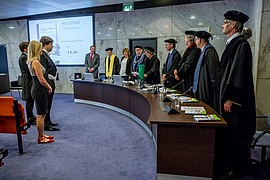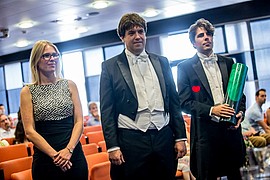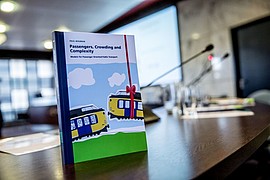PhD Defence: Paul Bouman

In his dissertation ‘Passengers, Crowding and Complexity’ ERIM’s <link people paul-bouman>Paul Bouman studies how microscopic data can be used in models that have the potential to improve utilization, while preventing excess crowding.
Paul defended his dissertation in the Senate Hall at Erasmus University Rotterdam on Thursday, 15 June 2017 at 15:30. His supervisor was Leo Kroon, but to our deepest regrets he passed away on September 14th. <link people peter-vervest>Prof. Peter Vervest took over the role of supervisor, with Prof. Anita Schöbel as co-supervisor. Other members of the Doctoral Committee were Prof. Kai Nagel (Technical University of Berlin), <link people dennis-huisman>Prof. Dennis Huisman (Erasmus University Rotterdam), <link people jan-van-dalen>Dr Jan van Dalen (Erasmus University Rotterdam),<link people eric-van-heck> Prof. Eric van Heck (Erasmus University Rotterdam), Prof. Stefan Voss (University of Hamburg), and Dr Marjan van den Akker (Utrecht University)
About Paul Bouman

Paul Bouman was born in the year 1984 in Bilthoven, The Netherlands. He obtained a cum laude Bachelor of Computer Science and a cum laude Master of Applied Computer Science at Utrecht University. During his bachelor studies he obtained a minor in Artificial Intelligence and programmed robotic dogs playing soccer in the AIBO League of the RoboCup. His master thesis was on ``A column generation framework for recoverable robustness''.
In 2011, Paul started his PhD research at the Rotterdam School of Management, Erasmus University within the Complexity in Public Transport (ComPuTr) project of the Netherlands Organisation for Scientific Research (NWO). As part of this project Paul focused on the modeling of peak demands in relation to public transport optimization.
In his research he focuses on the design and implementation of algorithms, models for scheduling and optimization, decision making in uncertain situations, simulation of (complex) systems and the processing of large data sets. In most of his research these techniques are applied to the domain of transportation in general and public transport in particular.
Paul attended multiple international conferences to present his research, including EURO, IFORS, TRISTAN and others. Currently, Paul works as an Assistant Professor within the Econometric Institute of the Erasmus School of Economics, where he conducts research and teaching related to Computer Science and Operations Research
Thesis Abstract

Passengers, Crowding and Complexity was written as part of the Complexity in Public Transport (ComPuTr) project funded by the Netherlands Organisation for Scientific Research (NWO). This thesis studies in three parts how microscopic data can be used in models that have the potential to improve utilization, while preventing excess crowding.
In the first part, the emergence of crowding caused by interactions between the behavior of passengers and the public transport operators who plan the vehicle capacities is modeled. Using simulations the impact of the information disclosed to the passengers by public transport operators on the utilization and passenger satisfaction is analyzed. A quasi-experiment with a large group of students in a similar setting finds that four types of behavior can be observed.
In the second part, algorithms that can extract temporal and spatial patterns from smart card data are developed and a first step to use such patterns in an agent based simulation is made. Furthermore, a way to generate synthetic smart card data is proposed. This is useful for the empirical validation of algorithms that analyze such data.
In the third and final part it is considered how individual decision strategies can be developed in situations where there exists uncertainty about the availability and quality of travel options. We investigate how the best strategy for a specific type of objective can be computed. Finally, we analyze which strategies are worthwhile to consider for a very broad set of objectives.
Photos: Chris Gorzeman / Capital Images


